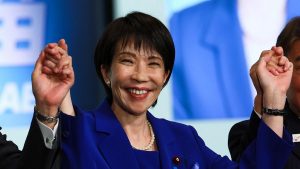Dollar Recovers and Precious Metals Soar

The dollar index (DXY00) today is up by +0.32%. The dollar is moving higher today after the Trump administration signaled an openness to a trade deal with China, dampening trade tensions. Today’s sharp rebound in stocks is limiting demand for the dollar in terms of liquidity.
The ongoing shutdown of the US government is bearish for the dollar. The longer the shutdown is maintained, the more likely the US economy will suffer, a negative factor for the dollar.
The Trump administration signaled openness on Sunday to a trade deal with China, an attempt to ease trade tensions. This follows President Trump’s threat last Friday to impose 100% tariffs on Chinese goods and restrict US software exports, effective November 1, in retaliation for China’s sweeping new curbs on exports of rare-earth materials and related technology.
The markets are pricing in a 97% chance of a -25 bp rate cut at the next FOMC meeting on Oct 28-29.
EUR/USD (^EURUSD) today is down by -0.46%. The euro is under pressure today from a stronger dollar. The euro is also being undercut by political uncertainty in France, although President Macron announced a new cabinet on Sunday, temporarily easing political uncertainty. The new government must now survive a no-confidence vote expected later this week at the National Assembly to avoid the need to call for a snap election.
The German Sep wholesale price index rose +1.2% y/y, the fastest pace in six months.
Swaps are pricing in a 2% chance of a -25 bp rate cut by the ECB at the October 30 policy meeting.
USD/JPY (^USDJPY) today is up by +0.78%. The yen is under pressure today from a stronger dollar. Also, a sharp rebound in US equity markets today has reduced safe-haven demand for the yen. Trading activity may be below normal in the yen today, as Japanese markets are closed for the Health-Sports Day holiday.
The yen has been under pressure over the past week due to concerns that the election of Sanae Takaichi as the leader of Japan’s ruling Liberal Democratic Party, which makes her the likely new Prime Minister of Japan, will result in a slower timeline for the BOJ’s policy tightening. Takaichi’s surprise victory has tempered expectations that the BOJ may raise interest rates as soon as this month, while raising concerns about an increased debt supply due to her support for expanded financial stimulus. Additionally, Japan’s governing coalition collapsed following talks between LDP leader Takaichi and Komeito leader Saito, which ended without an agreement. The move makes it harder for Takaichi to garner the support needed to pass budgets or any meaningful legislation, and could potentially lead to another election.
Do you want to build your own blog website similar to this one? Contact us








